Payment methods have rapidly evolved from traditional cash to advanced digital payment methods and, more recently, to cryptocurrency. With the rise of online payment methods, electronic payment methods, and digital wallets, users enjoy faster and more secure transactions. Today, cryptocurrency trading, powered by blockchain technology, introduces a new era of financial exchange. Popular options like Bitcoin, Ethereum, Tether, Solana, and Binance Coin are transforming the way we view money. As blockchain applications grow and crypto currency wallets gain traction, fintech in India continues to lead digital payments innovation, redefining how businesses and individuals manage transactions in a modern economy.
What’s next? Keep scrolling to find out:
🚀 Cash to Crypto: The shift from traditional to digital payment methods
🚀 Crypto Basics: What cryptocurrency is and how blockchain powers it
🚀 Top Coins: A quick look at Bitcoin, Ethereum, Tether, and more
🚀 Payment Comparison: Traditional vs cryptocurrency payment systems
🚀 Fintech in India: The rise of digital payments and fintech trends
What are the payment methods?
Payment methods refer to the ways individuals and businesses transfer money in exchange for goods or services. From handing over physical currency to tapping a smartphone, the range of choices has expanded with the advent of technology and global commerce. Understanding the types of payment methods helps consumers pick convenient and secure options.
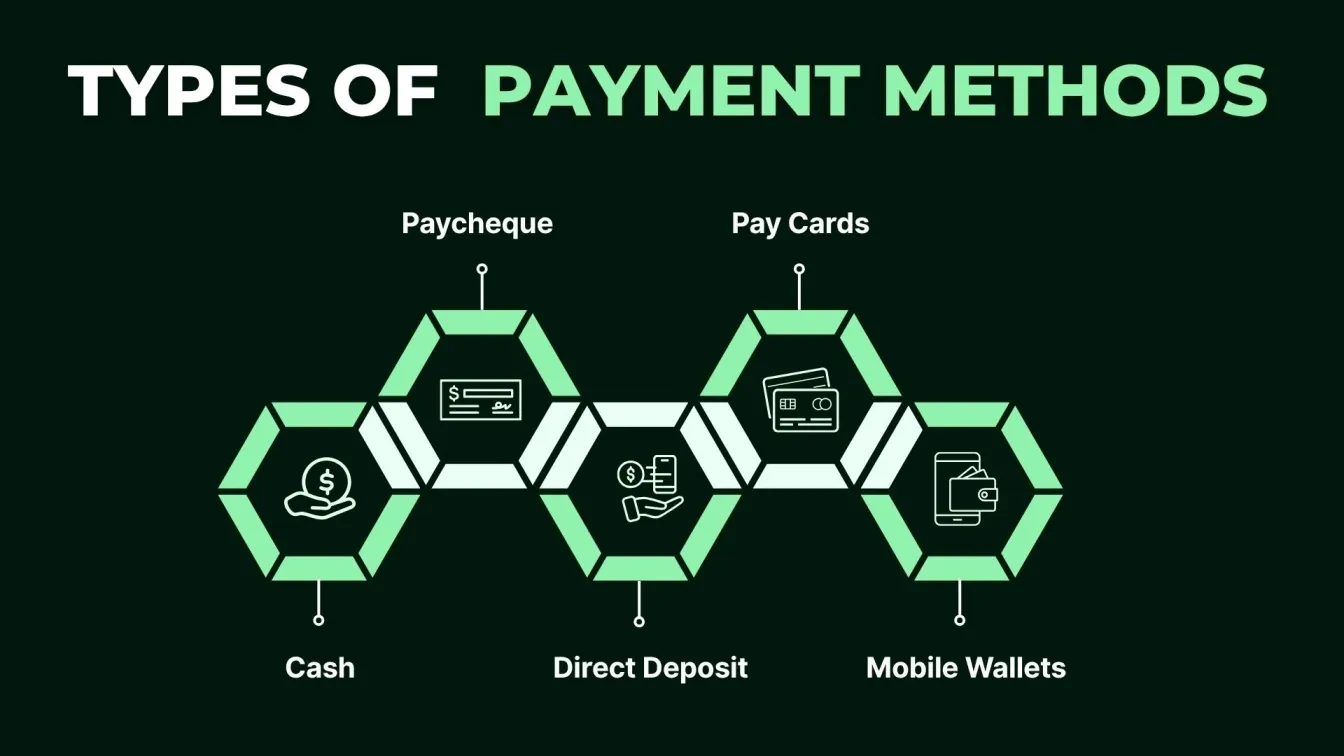
- Types of payment methods include cash, debit cards, credit cards, mobile wallets, bank transfers, and crypto currency.
- Digital payment methods like UPI, Google Pay, and Paytm are widely used in India for fast, contactless transactions.
- Business payment methods often involve point-of-sale systems, electronic invoicing, and integrated payment gateways.
- Saved payment methods in apps and browsers simplify checkout processes for frequent purchases.
- Electronic payment methods use internet-enabled systems to move funds instantly.
- Alternative payment methods, such as QR codes or prepaid cards, are popular in rural and semi-urban areas.
- Secure payment methods protect user data through encryption and fraud detection.
What is Cryptocurrency, and how does it work?
Cryptocurrency is a digital currency built on blockchain technology, allowing secure, peer-to-peer transactions without relying on central authorities. It is reshaping how people store, send, and invest money globally.
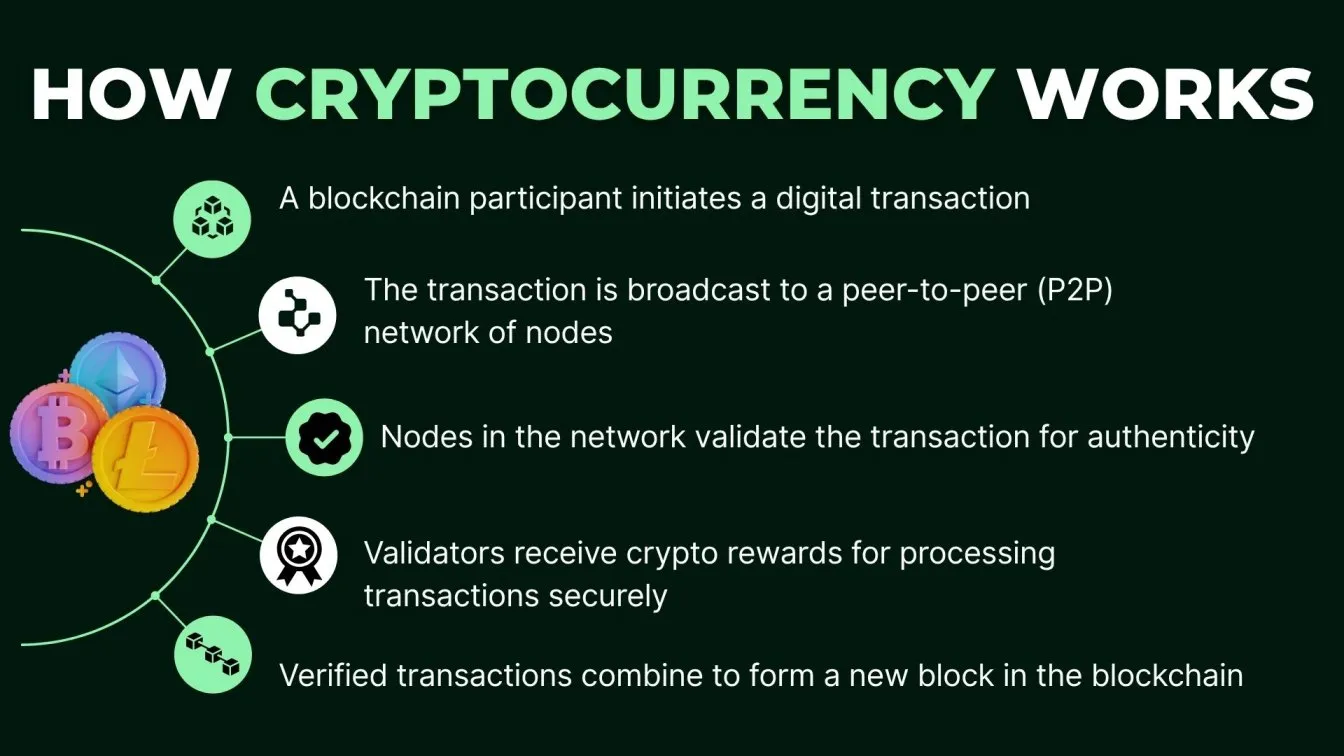
- Wallets for storing digital assets: A cryptocurrency wallet holds your private keys and allows secure access to crypto holdings.
- Price depends on market behavior: The cryptocurrency price changes based on investor sentiment, supply, demand, and media coverage.
- Online exchanges enable transactions: Cryptocurrency trading platforms let users buy, sell, and swap various digital currencies.
- Business transactions with crypto: A cryptocurrency payment gateway integrates with websites, enabling crypto-based purchases.
- Popular types of digital currencies: Common types of cryptocurrency include Bitcoin, Ethereum, Tether, and Binance Coin.
- Blockchain secures the system: Blockchain technology powers the entire ecosystem with transparency and fraud resistance.
- Mobile tools for fund access: Many cryptocurrency wallets come as apps for secure and easy mobile management.
- Decentralized structure: No middlemen are involved, making transactions faster, borderless, and cost-effective.
Types of Cryptocurrencies and their uses
Cryptocurrencies serve different purposes across the digital finance ecosystem. From value storage to facilitating fast, low-cost transactions, each crypto coin has its unique role powered by blockchain networks. Here's a look at five major cryptocurrencies and how they are used.
- Bitcoin: Known as the first and most popular cryptocurrency, it’s widely accepted for investment, payments, and a store of value, with an increasing bitcoin price globally.
- Tether: A tether crypto asset pegged to fiat currency (USD), used to avoid market volatility during cryptocurrency trading.
- Ethereum: Supports smart contracts and decentralized applications, with the Ethereum wallet enabling users to interact with the network securely.
- Binance Coin: Initially created for discounted trading fees, the Binance Coin price today reflects its extended use in gaming, travel bookings, and more.
- Solana: A high-speed blockchain platform used in NFTs, DeFi apps, and digital payments due to its low transaction fees and scalability.
Bitcoin
Bitcoin is the pioneer of crypto currency and remains the most valuable and widely adopted digital asset globally. It introduced the concept of decentralized finance and continues to influence the broader blockchain ecosystem.
- Market-driven value and growth: The bitcoin value is influenced by limited supply, demand, and mainstream adoption.
- Real-time pricing and updates: Investors track the bitcoin price today to make buying or selling decisions.
- Digital wallets for security: A Bitcoin wallet allows users to store and manage their holdings safely.
- Mining for transaction validation: Bitcoin mining involves solving complex problems to verify and secure the network.
- Future trends in investment: Experts use data trends for bitcoin price prediction to assess market potential.
Tether
Tether is a type of cryptocurrency known as a stablecoin. It is designed to maintain a 1:1 value with the US dollar, making it a popular option for minimizing volatility during cryptocurrency trading and digital transactions.
- Tether’s role in stability: The tether crypto token is widely used to hold value without exposure to market swings.
- USDT integration in platforms: Tether USDT is commonly listed on major exchanges for seamless trading.
- Cross-platform usability: The USDT tether token supports instant transfers across wallets and exchanges.
- Investment and utility use: As a tether coin, it is essential for executing trades and managing liquidity.
- Reliable storage option: Many investors use Tether for parking funds in a cryptocurrency wallet during volatile periods.
Ethereum
Ethereum is a decentralized blockchain platform that goes beyond just currency. It enables the creation of smart contracts and decentralized applications (dApps), making it a key player in the cryptocurrency space.
- Current market performance: The Ethereum price often reflects demand for dApps, NFTs, and blockchain innovation.
- Secure access to digital assets: An Ethereum wallet stores ETH and interacts with Ethereum-based platforms.
- Widespread ecosystem presence: The Ethereum crypto network supports thousands of decentralized apps and tokens.
- Developer-friendly infrastructure: Ethereum attracts blockchain developers due to its flexibility and smart contract capabilities.
- Real-world applications: From DeFi to gaming, Ethereum’s blockchain applications showcase the future of digital innovation.
Binance Coin
Binance Coin (BNB) is the native token of the Binance exchange, one of the largest platforms in the cryptocurrency market. Originally used to reduce trading fees, BNB has expanded its role across various blockchain services.
- Daily value tracking: Users monitor the Binance coin price for trading and investment decisions.
- Real-time updates: The Binance coin price today is influenced by platform usage and broader market trends.
- Ecosystem integration: BNB is used within Binance’s ecosystem, including decentralized apps and token launches.
- Growing utility: Accepted for digital payments, travel bookings, and financial services globally.
- Blockchain performance: Built on the Binance Smart Chain, it offers speed, low fees, and scalability for developers.
Solana
Solana is a high-performance blockchain platform known for its lightning-fast transaction speeds and low fees. It’s gaining popularity in cryptocurrency ecosystems, especially for decentralized finance (DeFi), NFTs, and gaming applications.
- Blockchain speed and scalability: Solana’s advanced blockchain technology supports thousands of transactions per second.
- Developer-friendly platform: Attracts blockchain developers due to its flexible programming environment and robust ecosystem.
- Reliable storage and access: A blockchain wallet is required to store and manage Solana-based assets securely.
- Growing community adoption: Solana is widely used for electronic payment methods and smart contract deployment.
- Future-ready platform: Powers next-gen digital payments with secure and scalable blockchain infrastructure.
How the world moved from cash payments to cryptocurrency
The transition from cash-based transactions to cryptocurrency marks a major shift in global financial behavior. This evolution has been fueled by the demand for convenience, speed, and security across borders and industries.
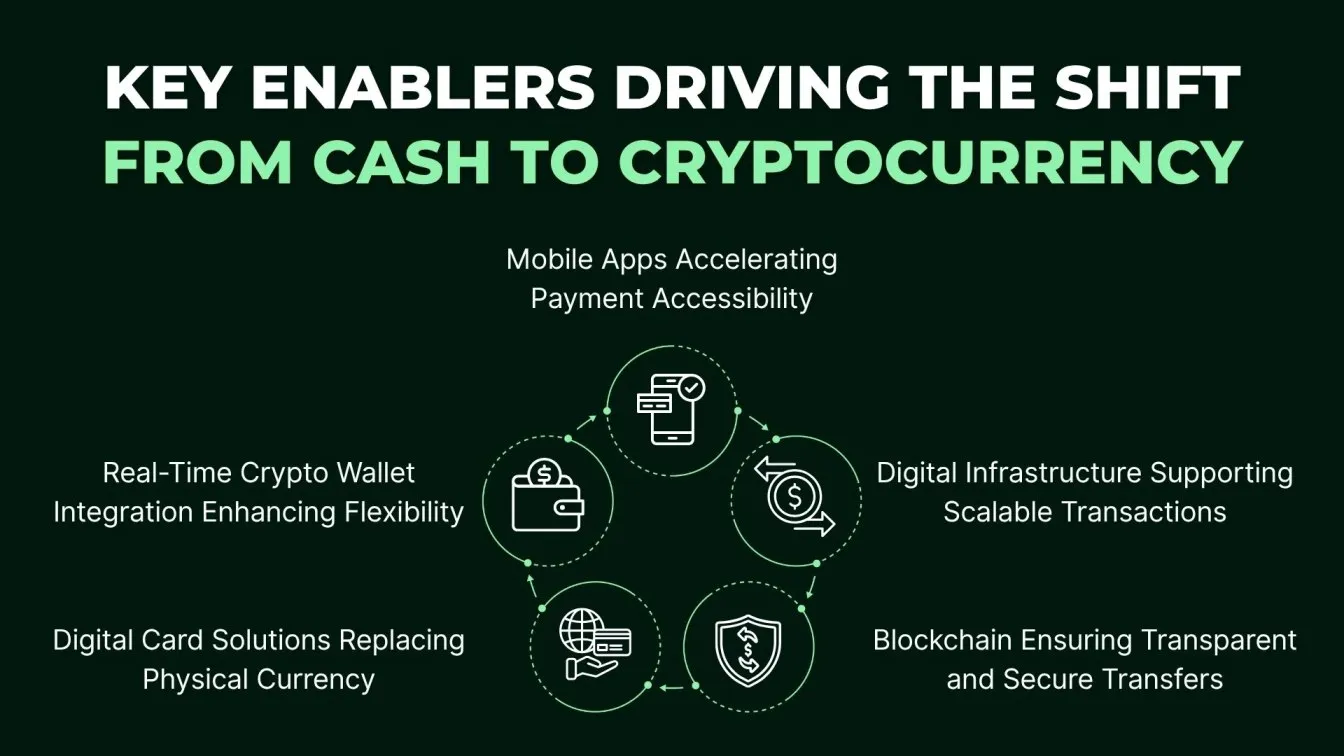
- Decline of physical currency: Traditional business payment methods like cash and cheques began to fade due to slow processing and limited tracking.
- Growth of digital options: The emergence of online payment methods introduced faster, more accessible alternatives through platforms and gateways.
- Rise of digital payments: Digital payment methods enabled secure peer-to-peer transactions using apps and wallets.
- Expansion of mobile solutions: Mobile payments and digital checkout details allowed seamless in-store and online purchases.
- Infrastructure for innovation: Enhanced digital infrastructure enabled scalable financial systems supporting both fiat and cryptocurrency.
- Decentralized future: Cryptos like Bitcoin and Ethereum transformed payments, shaping a digital payment landscape with fewer intermediaries.
What is blockchain, and how does it support crypto payments?
Blockchain is a decentralized digital ledger that records transactions across a distributed network. It plays a vital role in ensuring transparency, security, and speed for cryptocurrency transactions, revolutionizing the modern digital payment landscape.
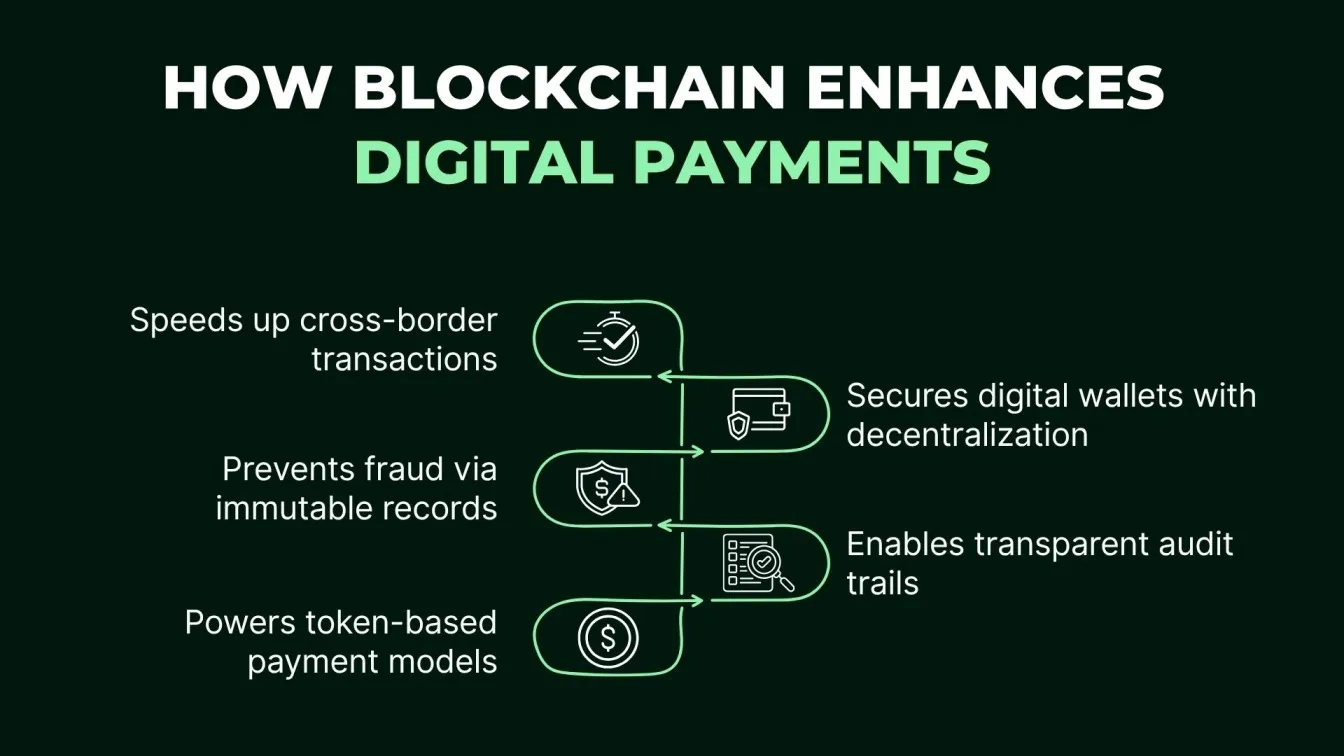
- Core technology: At its heart, blockchain technology enables peer-to-peer transfers without intermediaries, reducing delays and costs.
- Wallet integration: A blockchain wallet stores keys securely, enabling users to send or receive crypto assets like Ethereum or USDT.
- Transparent transactions: Every crypto payment is recorded on the ledger, enhancing accountability in electronic payment methods.
- Tamper-proof system: Blockchain ensures data integrity through cryptographic hashes, reducing fraud in digital payments.
- Support for smart contracts: Automates complex financial workflows, ideal for digital payment methods and DeFi apps.
- Scalable innovation: Attracts blockchain developers to build fast, secure apps for mobile payments and e-commerce platforms.
Key differences between traditional payment methods and cryptocurrency
Traditional payment systems rely on centralized institutions, while cryptocurrency offers a decentralized alternative built on blockchain applications. Understanding these differences helps users make better financial decisions in a fast-evolving digital payment landscape.
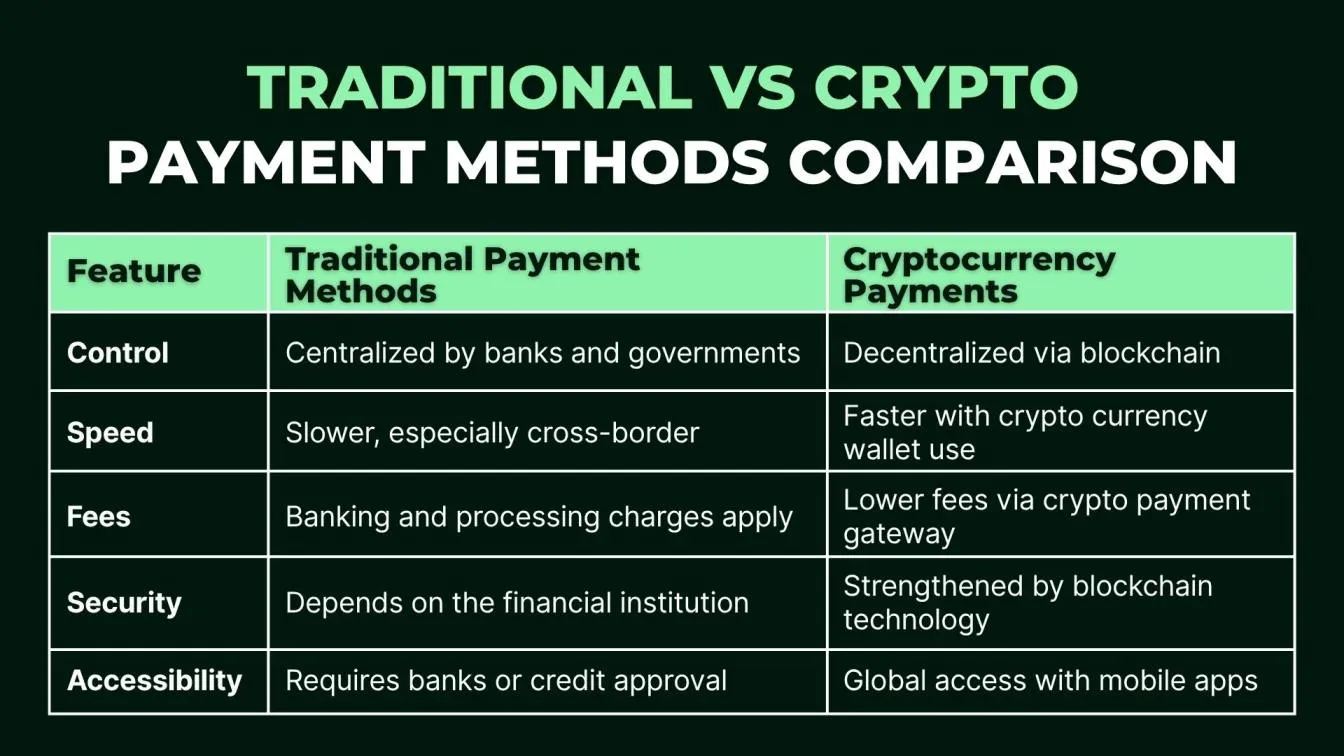
Fintech growth and the rise of cryptocurrency in India
India is witnessing a significant transformation in its financial ecosystem, led by rapid fintech growth and rising interest in crypto currency. This evolution is driven by innovation, inclusion, and increased trust in digital payments and blockchain-backed platforms.
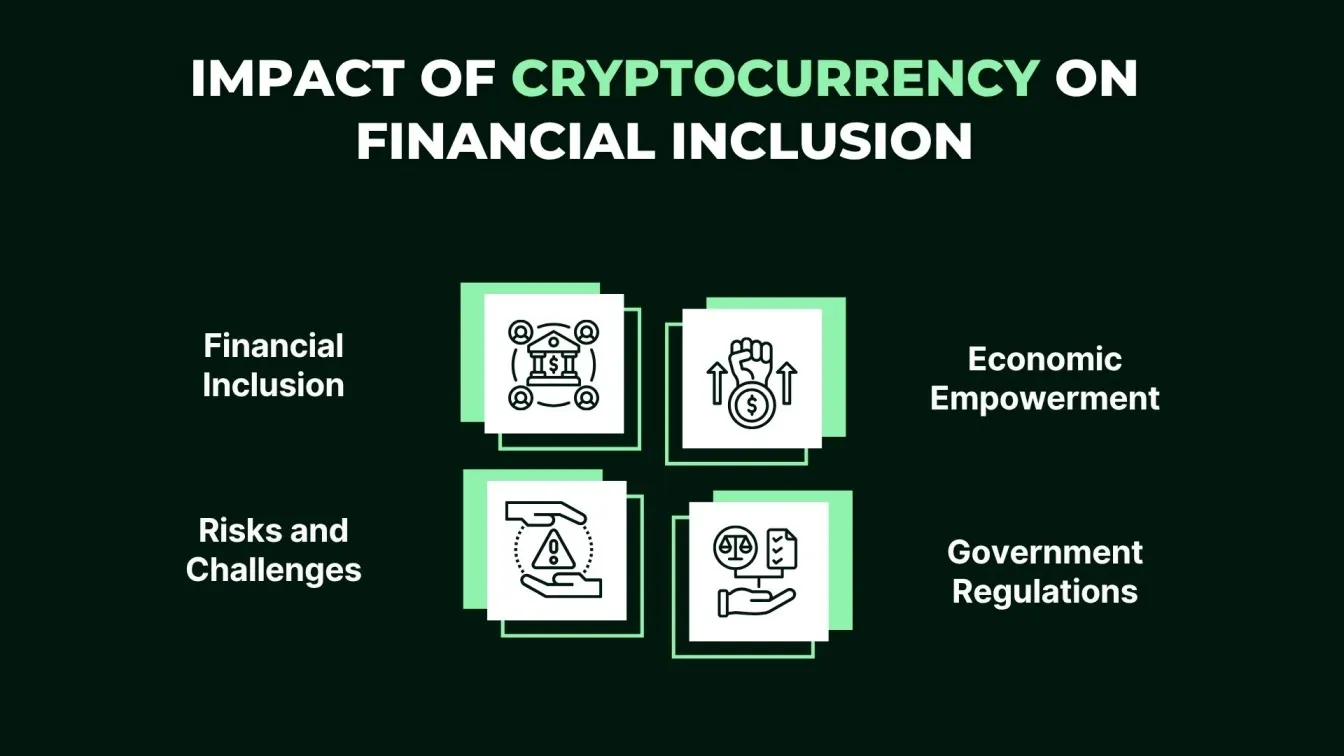
- Rise of fintech in India: Rapid adoption of digital payment methods by both urban and rural users has empowered startups and banks alike.
- Crypto currency integration: New-age investors in India are actively exploring crypto currency price trends and investing in blockchain assets.
- Fintech meets blockchain: Companies are experimenting with blockchain meaning, and use cases to offer faster and more secure transactions.
- Youth-driven shift: A tech-savvy population is fueling demand for digital payments trends and decentralized finance platforms.
- Supportive infrastructure: Growth in digital infrastructure and mobile internet penetration enhances access to crypto currency trading.
- Future-forward vision: India’s fintech companies are shaping a future where crypto currency wallets become mainstream.
Final Thoughts
As payments technology evolves, the journey from cash to crypto reflects how far the world has come in embracing speed, security, and innovation. With rising interest in digital payments, digital money, and blockchain applications, the world is moving towards cashless methods and smarter financial solutions. The growth of mobile apps, contactless payments, and crypto currency wallets is accelerating this change. Thanks to internet technology and supportive regulatory frameworks, the adoption rate of Digital Payment Revolution continues to grow. From bitcoin to fintech in India,this shift drives financial inclusion, empowering people globally with faster, secure, and accessible transactions.
As payment systems move from cash to crypto, ensuring reliability is crucial. Trusted names like Frugal Testing, a top software testing service provider, support this evolution with QA testing services for enterprises, functional testing solutions, and AI-driven test automation services. With operations in frugal testing Hyderabad and known for frugal product services, they stand out among software testing companies in India, driving quality in the digital finance transformation.
People Also Ask
What’s the difference between a hot wallet and a cold wallet?
A hot wallet is connected to the internet for quick access, while a cold wallet remains offline, offering stronger protection against cyber threats.
Can digital wallets hold both fiat and cryptocurrency?
Yes, digital wallets can store both fiat currency and cryptocurrencies, allowing users to manage multiple assets through a single application.
How do central bank digital currencies (CBDCs) differ from cryptocurrencies?
CBDCs are centralized and issued by governments, whereas cryptocurrencies are decentralized and operate independently through blockchain networks.
What are private keys in cryptocurrency, and why are they important?
Private keys are unique codes that authorize access to crypto wallets, and losing them means permanently losing access to your digital assets.
What is the role of a crypto exchange in digital payments?
Crypto exchanges enable buying, selling, and converting cryptocurrencies, and they often provide wallet services to streamline digital transactions.



.webp)

%201.webp)

